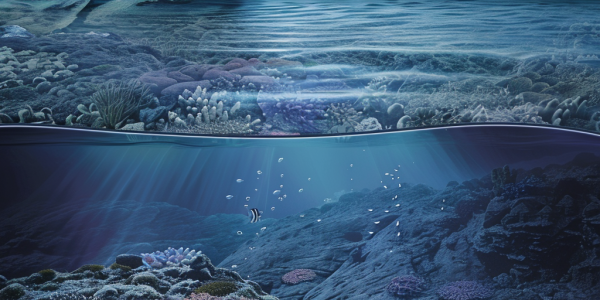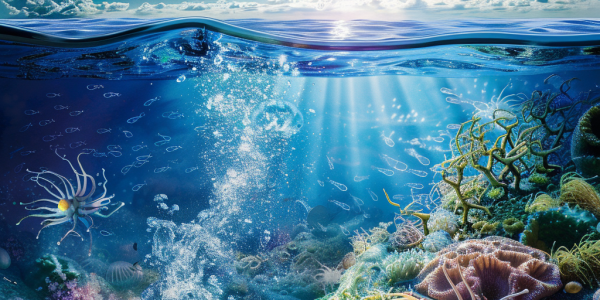Exploring Human Reproduction in Space: A Step Towards Interplanetary Survival
As humanity faces escalating challenges on Earth, experts advocate for exploring reproduction in space. Research led by Teruhiko Wakayama on mouse sperm aboard the ISS aims to unlock the potential for human colonies on celestial bodies, ensuring survival against existential threats. This groundbreaking work could revolutionize reproductive technology and genetic preservation, paving the way for a sustainable human presence beyond our planet.
Exploring Parallels: Earth’s Grand Canyon and Martian Geology
Recent studies reveal striking similarities between Earth’s Grand Canyon and Martian canyons, particularly Valles Marineris, enhancing our understanding of Martian geology and informing future human settlement plans. This groundbreaking research highlights the geological processes that shaped both landscapes, paving the way for exploration and potential habitation on Mars.
NASA’s Parker Solar Probe Uncovers Secrets of Solar Wind ‘Switchbacks’
Recent findings from NASA’s Parker Solar Probe reveal intriguing ‘switchbacks’ in the solar wind, shedding light on their origins and implications for solar dynamics. A collaborative study suggests solar jets may cause these magnetic fluctuations, crucial for understanding solar activity and its impact on space weather. Discover how these insights could affect communication systems and power grids on Earth.
NASA’s SWOT Satellite Unveils Most Detailed Ocean Floor Map to Date
NASA’s SWOT satellite has created the most detailed ocean floor map to date, revealing hundreds of uncharted underwater features. Launched in December 2022, this innovative technology enhances our understanding of oceanography, tectonic movements, and marine ecosystems. Discover how SWOT’s groundbreaking findings are set to impact climate research and ocean conservation efforts.
New Study Reveals Earth’s Day Length Changes Linked to Core Movements
A groundbreaking study reveals how Earth’s spin speed influences day length, utilizing ancient eclipse data and machine learning. Researchers found minor fluctuations in day duration over 3,000 years, highlighting the impact of core movements, climatic changes, and the Moon’s gravitational pull. This innovative approach enhances our understanding of Earth’s rotational dynamics and the intricate balance of forces shaping our planet.
Complete Mapping of Zealandia Unveils Earth’s Potential Eighth Continent
Recent geological research has mapped Zealandia, a submerged landmass considered the Earth’s potential eighth continent. This significant study by GNS Science reveals the geological history of Zealandia, linking it to the ancient supercontinent Gondwana. The findings enhance our understanding of plate tectonics and continental formation, challenging traditional definitions of continents.
Eclipses to Captivate Skywatchers in 2025
Get ready for an astronomical spectacle in 2025! Skywatchers can look forward to two partial solar eclipses and two total lunar eclipses, with visibility across various regions worldwide. Mark your calendars for March 29 and September 21 for the solar eclipses, and don’t miss the total lunar eclipses on March 13-14 and September 7-8. Prepare to witness these captivating celestial events!
Study Reveals Oceans’ Underestimated Role in Global Cooling
A groundbreaking study from the University of East Anglia reveals that oceans play a crucial role in global cooling, significantly underestimated in past climate models. Led by Dr. Charel Wohl, the research highlights how sulfur gases emitted by marine life, particularly methanethiol from plankton, enhance cloud brightness and reflect solar radiation, thereby regulating Earth’s temperatures. This pivotal finding calls for a reevaluation of climate models to better understand the ocean’s impact on climate dynamics and global warming mitigation.
Scientists Discover Massive Ocean Beneath Earth’s Crust
Scientists have discovered a massive ocean beneath the Earth’s crust, containing more water than all surface oceans combined. This groundbreaking finding, involving the mineral ringwoodite, reveals insights into a whole-Earth water cycle and challenges our understanding of geology and hydrology. The research highlights the vast potential of subterranean water reservoirs and their implications for life on Earth.
Urgent Study Reveals Rising Costs and Risks of Climate Tipping Points
A new study reveals alarming financial and environmental implications of climate change, indicating that humanity may have crossed critical climate tipping points. Published in npj Climate and Atmospheric Science, the research highlights the urgent need for immediate action to mitigate escalating costs and irreversible changes, such as coastal flooding and biodiversity loss. As the overshoot window closes, policymakers are urged to recognize the gravity of the situation and prioritize climate strategies to address these pressing challenges.










